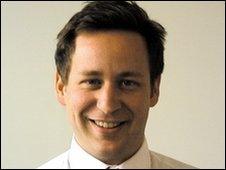BBC Licence fee 'to fund superfast broadband' roll-out
- Published

The wording mirrors that of the Tory manifesto
The BBC licence fee could be used to part-fund the roll-out of superfast broadband across the UK.
Details of the plan were outlined in the coalition deal struck between the Tories and the Lib Dems.
Ed Vaizey, who has been appointed as the new broadband minister, will oversee the roll-out.
The BBC said it looked forward to discussing the proposal with the government.
'Top slice'
The idea to use parts of the licence fee to fund services, particularly in rural areas, was outlined in the Tory manifesto.
The previous government had proposed a "broadband tax" of 50p per month to pay for next generation services.

Ed Vaizey will take on the demands of the digital economy
The Lib Dems supported the levy but it was dropped in the last-minute rush to push legislation through before Parliament was dissolved in April.
The Conservatives had always opposed the tax, instead preferring to allow the market to install services before government intervention. They had also outlined plans for so-called "top slicing" of the licence fee.
The new coalition document mirrors the wording of the Tory manifesto but is light on detail.
It says the new government will "ensure the rapid rollout of superfast broadband across the country" in both urban and rural areas.
It also says that it will ensure that equipment and infrastructure owned by BT and other telecoms firms can be used to deliver the services.
"If necessary, we will consider using the part of the TV licence fee that is supporting the digital switchover to fund broadband in areas that the market alone will not reach."
A BBC trust spokesperson said: "We note the reference to the possible use of an element of the licence fee on broadband roll out. We look forward to discussing this with the Government."
Sebastien Lahtinen of broadband news website Thinkbroadband said that the plan "leaves open the possibility of other funding mechanisms as well".
"In particular, we hope and expect that the government reviews the rating system for fibre optic cabling, dubbed the 'fibre tax', which is discouraging investment in the underlying cabling infrastructure that can get people connected to the sorts of super-fast services available in countries like South Korea," he said.
Cable firms are currently charged a business tax on the value of any newly installed fibre, regardless of the size of the network.
Digital divide
The new plans were published as the government announced that Mr Vaizey, a joint business and culture minister, would take responsibility for the digital economy.
"We are delighted. Ed knows what he is talking about and it is good to have a minister who knows about and cares about the issues," said Malcolm Corbett, chief executive of Inca (The Independent Networks Co-operative Association).
Mr Vaizey takes over from Labour's digital minister Stephen Timms, who is currently recovering from stab wounds inflicted by one of his constituents.
Some industry insiders were concerned about how well Mr Timms coped with his broadband brief given his other commitments at the Treasury.
Legislation about all things digital falls across a range of departments.
While the scrapped broadband tax formed part of the Finance Bill, the controversial Digital Economy Bill - which has passed into law before the end of Parliament - was drawn up by the Department for Business, Skills and Innovation
But many of the creative industries that add to the digital economy fall under the remit of the Culture department.
Labour appointed an extra minister to deal with the digital divide but this post was closed last year and it is unclear if anyone in the coalition government will have responsibility for this.